Thich Nhat Hanh is a Vietnamese Buddhist monk who lives in France. In 1966, at the age of 16, he joined a Zen Buddhist monastery. During his time there, he organized and reached out to those in the rural areas of his country to encourage education, establish healthcare services and improve local infrastructure.
In 1960, he studied comparative religion at Princeton and learned teachings of various religions and became fluent in several languages. He also taught at Colombia University. During this time, he met and became friends with Dr. Martin Luther King Jr. Dr. King referred to Hanh as “an apostle of peace and was urged by Thich Nhat Hanh to publicly denounce the Vietnam war.
With a strong feeling of responsibility to help his people, Thich Nhat Hanh returned to his home country and joined his fellow Buddhists in the use non-violent methods to promote peace. Openly critical of the civil war, the Vietnamese government and U.S. involvement in it, he was exiled from Vietnam for many years.
Finding refuge in southern France, he established a meditation center/monastery, and still lives there today. From here, he has written over 100 books, written poetry, and constructed retreats all over the world. Thousands of people travel from all over the world to visit and learn about mindfulness and meditation.
“Understanding means throwing away your knowledge.”
― Thich Nhat Hanh, Being Peace
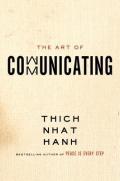 The art of communicating / Thich Nhat Hanh
The art of communicating / Thich Nhat Hanh
How do we say what we mean in a way that the other person can really hear? How can we listen with compassion and understanding?
Communication fuels the ties that bind, whether in relationships, business, or everyday interactions. Most of us, however, have never been taught the fundamental skills of communication—or how to best represent our true selves. Effective communication is as important to our well-being and happiness as the food we put into our bodies. It can be either healthy (and nourishing) or toxic (and destructive).
Thich Nhat Hanh reveals how to listen mindfully and express your fullest and most authentic self. With examples from his work with couples, families, and international conflicts, The Art of Communicating helps us move beyond the perils and frustrations of misrepresentation and misunderstanding to learn the listening and speaking skills that will forever change how we experience and impact the world.
In this beautiful and lucid guide, Zen master Thich Nhat Hanh offers gentle anecdotes and practical exercise as a means of learning the skills of mindfulness–being awake and fully aware. From washing the dishes to answering the phone to peeling an orange, he reminds us that each moment holds within it an opportunity to work toward greater self-understanding and peacefulness.
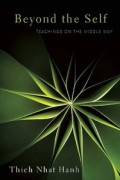 Beyond the self : teachings on the middle way / Thich Nhat Hanh
Beyond the self : teachings on the middle way / Thich Nhat Hanh
One of the Buddhism’s most central ideas is the importance of transcending “either/or” thinking to avoid the trap of extremist views. In Beyond the Self Thich Nhat Hanh suggests that we can find tranquility by embracing all aspects of life, instead of focusing on what we like and dislike. The book contains Nhat Hanh’s original translation of the Sutra on the Middle Way, as well as his commentary on how we can use this teaching to better understand how to navigate our difficulties and find peace of mind. By changing how we see the world, Beyond the Self helps us transform ourselves.
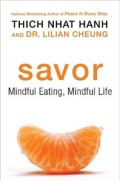 Savor : mindful eating, mindful life / Thich Nhat Hanh and Lilian Cheung
Savor : mindful eating, mindful life / Thich Nhat Hanh and Lilian Cheung
Offering practical tools, including personalized goal setting, a detailed nutrition guide, and a mindful living plan, the authors help us to uncover the roots of our habits and then guide us as we transform our actions. Savor teaches us how to easily adopt the practice of mindfulness and integrate it into eating, exercise, and all facets of our daily life, so that being conscious and present becomes a core part of our being.
It is the awareness of the present moment, the realization of why we do what we do, that enables us to stop feeling bad and start changing our behavior. Savor not only helps us achieve the healthy weight and well-being we seek, but it also brings to the surface the rich abundance of life available to us in every moment
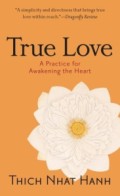 True love : a practice for awakening the heart / Thich Nhat Hanh ; translated by Sherab Chödzin Kohn
True love : a practice for awakening the heart / Thich Nhat Hanh ; translated by Sherab Chödzin Kohn
True Love offers timeless insight into the nature of real love. With simplicity, warmth, and directness, he explores the four key aspects of love as described in the Buddhist tradition: lovingkindness, compassion, joy, and freedom—explaining how to experience them in our day-to-day lives. He also emphasizes that in order to love in a real way, we must first learn how to be fully present in our lives, and he offers simple techniques from the Buddhist tradition that anyone can use to establish the conditions of love.
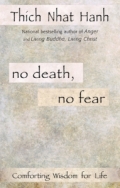 No death, no fear : comforting wisdom for life / Thich Nhat Hanh
No death, no fear : comforting wisdom for life / Thich Nhat Hanh
With hard-won wisdom and refreshing insight, Thich Nhat Hanh confronts a subject that has been contemplated by Buddhist monks and nuns for twenty-five-hundred years—and a question that has been pondered by almost anyone who has ever lived: What is death? In No Death, No Fear, the acclaimed teacher and poet examines our concepts of death, fear, and the very nature of existence. Through Zen parables, guided meditations, and personal stories, he explodes traditional myths of how we live and die. Thich Nhat Hanh shows us a way to live a life unfettered by fear.
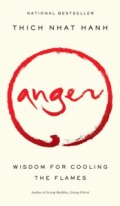 Anger : wisdom for cooling the flames / Thích Nh́ât Hạnh
Anger : wisdom for cooling the flames / Thích Nh́ât Hạnh
It was under the bodhi tree in India twenty-five centuries ago that Buddha achieved the insight that three states of mind were the source of all our unhappiness: wrong knowing, obsessive desire, and anger. All are difficult, but in one instant of anger—one of the most powerful emotions—lives can be ruined, and health and spiritual development can be destroyed. With exquisite simplicity, Buddhist monk and Vietnam refugee Thich Nhat Hanh gives tools and advice for transforming relationships, focusing energy, and rejuvenating those parts of ourselves that have been laid waste by anger. His extraordinary wisdom can transform your life and the lives of the people you love, and in the words of Thich Nhat Hanh, can give each reader the power to “change everything.”
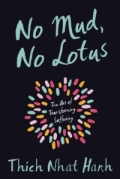 No mud, No Lotus / Thich Nhat Hanh
No mud, No Lotus / Thich Nhat Hanh
No Mud, No Lotus teaches us how to find happiness by getting past suffering. He shows us how the only way to do this is by acknowledging and transforming suffering, not running away from it. He shares with us the practices of stopping, mindful breathing and deep concentration that will enable us to generate the energy of mindfulness within our daily lives; using that energy, we can embrace pain and suffering, calm them down, instantly bringing us a measure of freedom and a clearer mind. Serene and wise, No Mud, No Lotus is an immensely practical guide to overcoming life’s big and little problems.

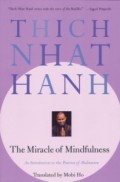 The miracle of mindfulness [sound recording] : an introduction to the practice of meditation / Thich Nhat Hanh ; translated by Mobi Ho
The miracle of mindfulness [sound recording] : an introduction to the practice of meditation / Thich Nhat Hanh ; translated by Mobi Ho